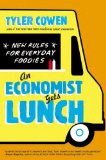Summary | Excerpt | Reviews | Beyond the Book | Readalikes | Genres & Themes | Author Bio

Critics' Opinion:
Readers' Opinion:
First Published:
Apr 2012, 304 pages
Paperback:
Feb 2013, 304 pages
 Book Reviewed by:
Book Reviewed by:
Elizabeth Whitmore Funk
Buy This Book
Earlier food worlds were no paradise. If we go back to the middle of the nineteenth century, American consumers were suspicious of the concepts of fresh fruit, vegetables, meat, and milk, unless it came from their farm or a neighbor's. In practice "extremely fresh" and "spoiled" were close concepts, as even today any amateur cheese or sausage maker will attest. Back then, people did not know where "fresh" food came from or how long it had been sitting exposed to the heat and elements. There was no expiration date on the package and perhaps no package. Foods alternated between periods of extreme glut and extreme scarcity, depending on the seasons and the locale. High transport costs kept most fresh foodstuffs from most parts of the world. Most foods were local but no one was especially proud of that fact. Costs of refining and processing were almost nonexistent - sugar being one notable exception - if only because there were so few ways of usefully transforming food for broader marketing and sale, given the technologies and the economic constraints of that time.
Many foods were preserved, often using centuries-old techniques. Vegetables were pickled in salt brine and vinegar, not always the most flavorful combination. Fruits were dried, using the sun if possible. Meats and fishes were salted and smoked or stuffed into tightly sealed jars. Food poisoning was common. Making and taking care of the food involved a lot of hard work. There were some fine meals, and a lot of people felt "close to the land" - too close - but overall this was not a culinary world to envy.
By the 1920s all this had changed, at least in the United States. Canals, railroads, and later trucks lowered transportation costs - including food transportation costs - to a fraction of their former level. In this new world, riches were made from foodstuffs that lasted long enough to bear transport. Entrepreneurs therefore invested in technologies of shipping, storage, and preservation - and so began the modern world of rich and plentiful food ingredients. Americans received far more access to food than was ever the case before in the history of the world. No longer was supply limited to the pickled, the preserved, and what was grown on the family farm. Relative to wages, food was suddenly much cheaper and supply was more reliable.
Some mediocre frozen and canned foods became possible too, but don't damn commercialization for that reason. The printing press brought us both good and bad novels, but was a cultural boon nonetheless.
Appreciating agribusiness doesn't mean you have to deny the problem of fertilizer runoff, endorse government subsidies to corn syrup, or dine at McDonald's. Modern, cheap agriculture can be thought of as a platform upon which subsequent food innovation will occur. The platform needs reform, but for the most part it has fed humankind very well. If we do not understand the useful components of this platform, we will fail in finding the best and cheapest meals, and furthermore we will endanger the platform itself. Were it to collapse, famines would become ordinary.
In the meantime, we need to learn how people - right now - are using the platform for better and more humane ends. The food in Nicaragua really was wonderful and it is a testament to the creative powers of the individual, even the very poor individual. The United States however does not and cannot organize its food network in the same ways. France and Japan are different yet. So to eat well, to be environmentally friendly, or to make the right food decisions about our laws or our diets, we need a comprehensive understanding of how food markets work. We need a better understanding of how to take all the information before us and turn it into something useful.
Why Every Meal Counts
Nicaragua is an unusual environment, but my experiences there illustrate the compelling messages I hope this book will make clear.
Excerpted from An Economist Gets Lunch by Tyler Cowen. Copyright © 2012 by Tyler Cowen. Excerpted by permission of Dutton. All rights reserved. No part of this excerpt may be reproduced or reprinted without permission in writing from the publisher.





The Flower Sisters
by Michelle Collins Anderson
From the new Fannie Flagg of the Ozarks, a richly-woven story of family, forgiveness, and reinvention.

The House on Biscayne Bay
by Chanel Cleeton
As death stalks a gothic mansion in Miami, the lives of two women intertwine as the past and present collide.

The Funeral Cryer by Wenyan Lu
Debut novelist Wenyan Lu brings us this witty yet profound story about one woman's midlife reawakening in contemporary rural China.
Your guide toexceptional books
BookBrowse seeks out and recommends the best in contemporary fiction and nonfiction—books that not only engage and entertain but also deepen our understanding of ourselves and the world around us.